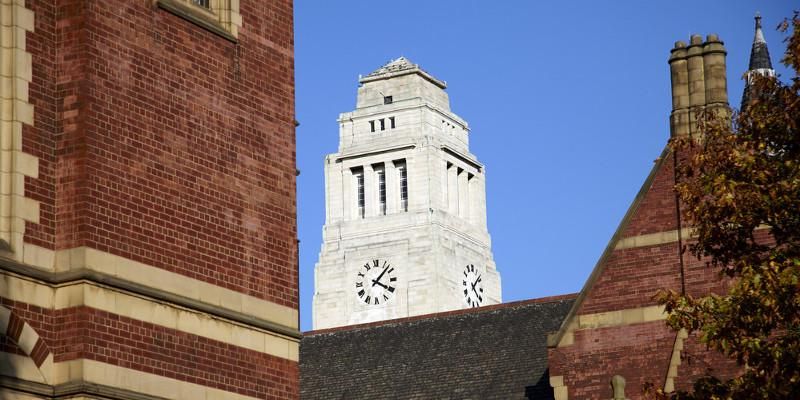
Government ministers have announced that the University of Leeds is to receive a multi-million pound share of funding for research into advanced materials.
Part of a £235 million commitment by Government for the Henry Royce Institute, Leeds will receive £10 million to support its world-leading research.
It follows the decision by the University to invest £96 million to bring together research and teaching across Engineering and Physical Sciences, to inspire new ways of working across disciplines, help tackle industry challenges and support industry collaboration.
Bragg Centre
The £96 million investment includes the creation of the Bragg Centre, dedicated to the growth, fabrication, characterisation, imaging and measurement of advanced functional materials.
It will be the focus for new laboratories and facilities to that are part of the Henry Royce Institute.
Atoms to devices
The initial investment by Government includes £4.1 million for new precision equipment, to support the atoms to devices (A2D) research theme, which will focus on the translation of new material systems from the atomic scale to operational devices.
“Leeds is rightly at the heart of securing the UK’s position as world leader in advanced materials.”
Professor Lisa Roberts, Deputy Vice-Chancellor: Research and Innovation at the University, said: “This is a significant investment and signals that we are playing a critical role in the UK's advanced functional materials activity.
“Leeds, as a key partner of the Henry Royce Institute, is rightly at the heart of securing the UK’s position as world leader in advanced materials, and we are very proud to be bringing together some of the greatest minds and outstanding facilities to drive this research.
“This kind of innovation is absolutely critical to support all industrial sectors and the national economy.”
The A2D theme is one of nine key areas of research for the Henry Royce Institute, which is hosted by the University of Manchester.
Collaborative research
It is jointly led by Edmund Linfield, Professor of Terahertz Electronics in the Faculty of Engineering at the University of Leeds, alongside colleagues at Imperial College London, and brings together researchers in Leeds from across the engineering and physical sciences.
Following the announcement that Professor Roberts has also been elected to join the Henry Royce Institute governing board, she added: “I am delighted to be one of the four founding partner governing board members and look forward to playing a key role in ensuring that the Institute delivers real benefits to the universities involved, industry and the UK”.
Ministerial support
Greg Clarke, Secretary of State for Business, Energy and Industrial Strategy, who announced the initial £128 million investment, said: “Research and development has a proven track record of making our economy more competitive and creating new products, services and better ways of doing business.
“Research and development has a proven track record of making our economy more competitive and creating new products, services and better ways of doing business.”
“For these reasons, we’ve placed the UK’s strengths in science, research and innovation at the core of our modern industrial strategy.”
Jo Johnson, Minister for Universities and Science, added: “The Royce Institute and grants announced today will benefit our world-leading science and innovation sector.
“The Government is determined to support further commercialisation of our science and research discoveries as innovation leads to new products, services and better ways of doing business.
“Our modern industrial strategy will help us ensure the UK maintains its status of one of the best places in the world to conduct research, discover and innovate.”
The beneficiaries in this first tranche of funding include the Universities of Cambridge and Sheffield, Imperial College London and the Culham Centre for Fusion Energy (CCFE), that form the satellites - or spokes - of the Institute, along with the Hub at The University of Manchester.
Other spokes, the Universities of Liverpool and Oxford and the National Nuclear Laboratory, will receive funding at a later date.
The announcement is part of the £235 million capital funding announced in the Autumn Statement 2015 and comes from the Engineering and Physical Research Council (EPSRC).
It forms a crucial component of the Government’s Northern Powerhouse initiative and an attempt to boost economic growth in the North of England and balance the UK economy.
Further information
Professor Linfield is available for interview, contact Peter Le Riche in the University of Leeds press office on 0113 343 2049 or email p.leriche@leeds.ac.uk
Henry Royce Institute for Advanced Materials
- A major part of the funding will be devoted to the construction of the building to host the Institute at the University of Manchester. The Institute’s aims are to:
- Accelerate safely and with confidence the use of advanced materials in existing and emerging industrial sectors within the UK.
- Underpin and provide growth to the entire UK manufacturing base and reduce the time to market from invention to application for new materials, with significant knock-on impact for the national economy.
- Invent and innovate new materials in various sectors covering fabricating, testing, analysing and demonstration, under different operating environments and provide the 'missing link' in the development of materials within the UK.
- Cover a number of sectors from soft-to-hard-to-functional materials allowing translation of ideas across sectors.
- Provide an international beacon for UK expertise and deliver national leadership and critical mass to allow identification of expertise within the UK.Attract inward national and international investment from industry, academia and government.
- Provide the required skills and training, allowing industrialists to work alongside academics, to produce the expertise of the future from apprentices to doctorates.